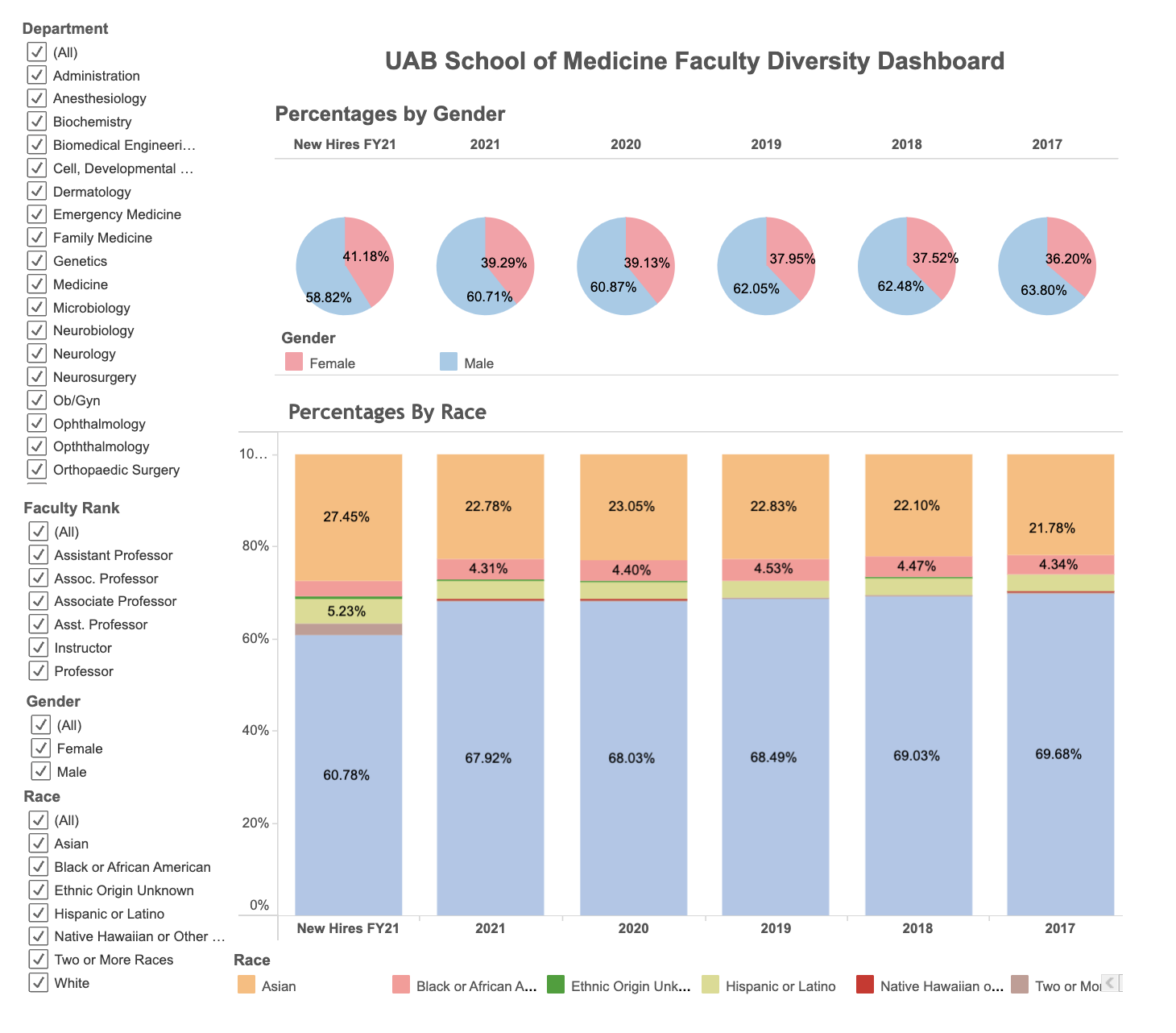From its inception in 2004, Diversity Month (April) has been a time to reflect on the various cultures that make up the world—its similarities, as well as its differences—and unite under mutual understanding.
The foundational values and aspirations of the Diversity Month commemoration are visible in the Heersink School of Medicine through diversity and inclusion initiatives, continued learning, and fostering colleagues.
The Heersink School of Medicine Office for Diversity and Inclusion (ODI), founded in 2014, was created to increase diversity and cultivate a culture of inclusivity and equity.
What ODI has done
Since the formation of the Office for Diversity and Inclusion, the office has worked to grow the number of students Underrepresented in Medicine (URiM) at the Heersink School of Medicine. It created a more comprehensive admissions process, and in concert with other initiatives and variables, the school has grown URiM enrollment from 9% in 2016 to 19% in 2021.
Similarly, the school has seen an increase in URiM residents and fellows—growing from 8.3% in 2016 to 12.49% in 2021.
For residents and fellows, ODI has established priorities to create a more diverse and inclusive environment. For example, URiM Housestaff is an organization that promotes a nurturing and inclusive environment from the first day a graduate medical student chooses UAB. As a member of the housestaff, residents are encouraged to network with each other as well as faculty members.
Another opportunity for residents to network with faculty is through the Heersink School of Medicine Office for Diversity and Inclusion American Medical Women’s Association (AMWA) chapter. While the word “women” might be in the name, AMWA invites all residents and faculty to join its monthly meetings on topics that range from preparing for tenure to discussions on parental leave. Students wishing to participate in the conversation are invited to join the student AMWA chapter.
For faculty and staff members, ODI ensures initiatives are aligned with the needs and wants of the school. Faculty and staff liaison groups were formed to facilitate bidirectional communication and collaboration on ODI-based and departmental diversity and inclusion activities.
The Staff Diversity Liaisons group aims to increase support and programming for the professional advancement of underrepresented staff. The group meets regularly to provide feedback on priorities, initiatives, and activities that foster a more inclusive and equitable professional environment for people from all genders, ages, cultures, and backgrounds.
URiM faculty members are invited to join one of the Hispanic and Latin American, Black/African American, and Asian American and Pacific Islander associations. Members of these associations are qualified for nomination for the annual Professional Excellence Awards.
Throughout the year, faculty and staff members are also selected to participate in training sessions hosted by ODI on topics such as building belonging, cultural competency, conflict resolution, and implicit bias.
Should an event arise where any student, faculty, or staff member needs to report misconduct or mistreatment, ODI has developed a private system for reporting. Reports made through ODI are treated with the greatest degree of discretion possible, and confidentiality is prioritized as much as possible as each case is reviewed by specially assigned ODI staff.
Resources to guide departments
While developing and implementing initiatives are important to the Office for Diversity and Inclusion, so is transparency and creating resources that empower departments to create change from within.
The Diversity Dashboard shows how faculty representation has changed in areas throughout the school of medicine. This resource allows users to see up-to-date percentage breakdowns of each department by race and gender over five years.

Everyone in the Heersink School of Medicine is responsible for contributing to the culture within their respective departments. As such, all are invited to explore the concept of inclusivity and the part each individual plays in its advancement. To serve as a guide, the ODI has developed The Common Thread: Find Yourself in Everyone.
In a series of four modules, these videos will challenge, engage, and motivate self-inquiry. Doing so will afford faculty, staff, trainees, and students the promise of self-awareness and enrichment.
What ODI is working toward
To prepare itself for continued diversity and inclusion efforts in the years to come, the office has created two new roles: Associate Dean for Diversity and Inclusion, Dr. Raegan Durant; and Assistant Dean for Medical Education for Diversity and Inclusion, Dr. Latesha Elopre.
Along with the current organizational structure, the office aims to continually improve support of its students, faculty, and staff in ways specific to their varied needs.
Currently, URiM mentees and mentors can join UAB Connect, a portal to facilitate matches between the groups. Moving forward, ODI teams will look to expand into Phase II of the effort. During this rollout, students from rural areas, economically disadvantaged backgrounds, first-generation medical students, LGBTQ+, and religious minorities will also be able to participate.
Soon, LGBTQ+ residents will also be able to join MedPride—an organization committed to empowering sexual and gender minority students in health care.
For faculty, ODI will continue to support, nurture, and expand the relevant faculty associations available to join. As well, ODI plans to offer trainings on new and relevant topics, such as microaggression.
As plans develop from the meetings hosted by the Diversity Staff Liaisons, the Office for Diversity and Inclusion will communicate frequently about new staff initiatives.
Receive ODI updates and the latest news by subscribing online.
